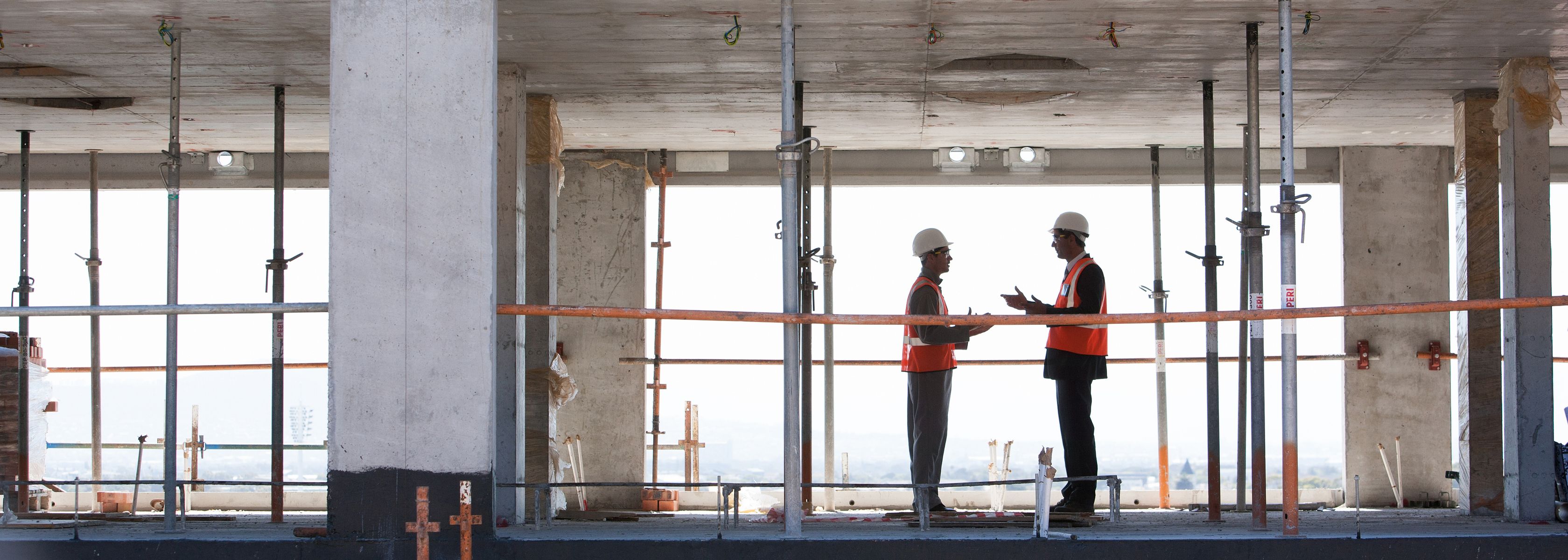Protecting the present, building for the future
The construction industry is changing and evolving at a record pace, forcing you and your growing company to keep up with compliance, site-specific regulations and mandates, supply chain issues, managing risk, and a host of other project-essential demands.
Whether you’re working in commercial or residential construction as an owner, developer, contractor, subcontractor, architect, or engineer, you face a variety of risks that can have a drastic impact on the bottom line. Fire, water damage, labor shortages, workers' compensation claims, and environmental factors place a heavy burden on the industry, making the need for a top-notch risk management team an ever-growing necessity.
Solutions & Capabilities
Before your team even puts pen to paper or a shovel in the ground, we map out a risk management plan that covers every phase and angle of your project. Our construction specialists across the company including Burke Insurance Group, Delmarva, and Thomas McGee Group, have been at the forefront of the industry and take a 360-degree approach to manage your risk throughout the lifecycle of a project. From financing, to design, to pre-construction, to construction and the eventual property sale, our team’s industry experience and agility will help you customize a program that best fits the needs of your business and unique projects, no matter how complex including:
-
Insurance solutions such as General Liability, Builders Risk, Workers' Compensation, Professional Liability, Environmental, and Pollution Liability, and more
-
Financing & Pre-Construction including design, contract, and exposure reviews
-
Risk Management solutions such as safety and loss control, OSHA regulations, and claims advocacy
-
Alternative Solutions such as OCIPs, CCIPs, captives, and large deductibles
We are also actively involved in construction industry associations including the Associated General Contractors of America (AGC), the Associated Builders and Contractors (ABC), the National Association of Surety Bond Producers (NASBP), and others.
Following a comprehensive review of your current policies, procedures, protocols, and programs, we’ll make sure that potential risks are discovered and covered. Whether you need strategic counsel on professional safety, contract reviews, alternative solutions, or to implement general liability measures, we’re ready to help manage your risk and help you build for the future.
What is a Construction Wrap Up Insurance?
A construction wrap up is a broad term to describe any program where one party of a construction project — the owner, developer, or contractor — purchases insurance for the term of construction. Coverages can include General Liability, Excess Liability, Workers' Compensation, Pollution Liability, and Professional Liability.
What is a OCIP?
An Owners Controlled Insurance Program, or “OCIP” is purchased and managed by the Owner.
What is a CCIP?
A Contractor Controlled Insurance Program, or “CCIP” is purchased on managed by the General Contractor.
Why does a Wrap Up make sense?
A Wrap Up will cover all contractors who are on-site during construction and provide coverage for the statutory period of completed operations (5 - 10 years in most states). A wrap up eliminates the cost of the contractors’ insurance and improves the quality of insurance available. Wrap up insurance offers a definable set of limits for the life of a project, eliminating the year-to-year purchase. A wrap up can provide a more definable cost over the life of a multi-year project by avoiding annual policy reviews.
How large does a project need to be to qualify for a Wrap Up?
For smaller projects of $15M - $100M, a Liability Only Wrap Up — that is, a program that provides coverage to the Owner, GC, and all subcontractors for General and Excess Liability — is achievable. It is fairly common for Residential Construction projects to be insured via a Liability only Wrap Up, due to the need to purchase longer tail coverage than most contractors are able to secure on their own. For projects to include workers' compensation and liability, construction values would need to be over $100M, and in some states $150M.
Explore
- Industries
- Agriculture
- Architects & Engineers
- Aviation
- Cannabis
- Construction
- Dental
- Education
- Entertainment
- Financial Services
- Fine Art
- Healthcare
- Law Firms
- Logistics & Transportation
- Marine & Yacht
- Nonprofit & Human Services
- Private Equity
- Public Sector
- Real Estate
- Relocation
- Waste & Recycling
- Wineries & Vineyards
- Solutions
- Commercial Insurance
- Captives
- Casualty
- Cyber
- Environmental
- Contractors Pollution Liability
- Environmental Excess
- Environmental Liability Transfer
- Environmental Liability - Healthcare
- Environmental Liability - Higher Education
- Pollution Legal Liability
- Environmental Liability - Private Equity
- Professional Environmental Liability Insurance
- Real Estate Development
- Remediation Cost Cap
- Secured Creditor Protection for Lenders
- Underground Storage Tanks
- Executive Risk Solutions
- International
- Property
- Surety
- Employee Benefits
- Financial & Wealth
- Private Client Services
- Private Client Services Overview
- Homeowners
- Flood
- Collections
- Umbrella & Excess Liability
- Auto
- Collector & Exotic Car
- Boat & Yacht
- Travel Medical & Trip Insurance
- Family Office
- Cyber Insurance - Family Office
- Cyber Insurance - Individuals
- Life Insurance
- Specialty Coverages
- Private Client Risk Resource Center
- Reinsurance
- Risk Management Services
- Commercial Insurance
- Consulting
- News and Insights
- Company









